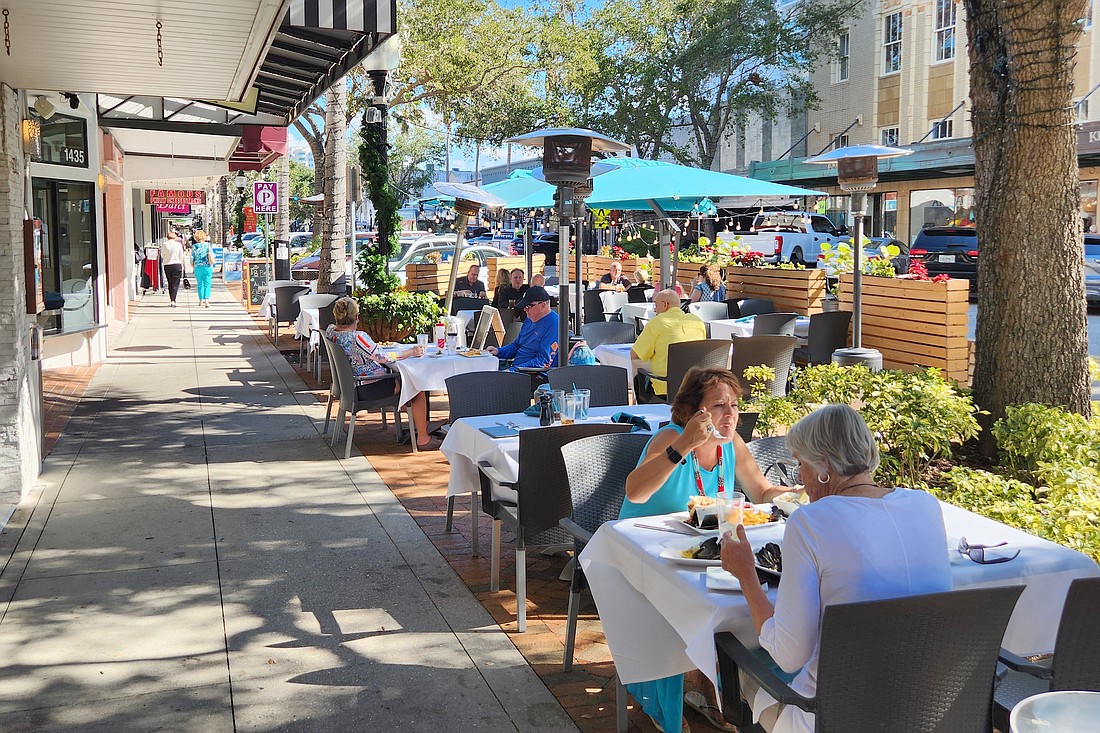- November 25, 2024
-
-
Loading

Loading
 Photo by Andrew Warfield
Photo by Andrew Warfield
Unless the city adopts a new ordinance by the end of of next month, the pandemic-era on-street dining option for downtown restaurants is scheduled to expire on March 31.
The Sarasota City Commission will take up the matter at its Feb. 21 meeting, scheduled one day later than the usual Monday in observance of Presidents Day.
Last November, some restaurateurs asked the City Commission to extend parklet dining temporarily until a permanent solution can be found. At the time, it was expected to expire on Dec. 31. Of the 19 restaurants that put tables on the street in public parking spaces starting in 2020 just to stay in business, 15 still have active permits to use them for ever popular al fresco dining.
Not only do parklets expand capacity as restaurants continue to recover from COVID-19 restrictions, they are an option for customers who remain hesitant to enter crowded spaces.
Among the conditions of the extension granted last fall, restaurants are required to pay the city $25 per day per parking space occupied to offset lost parking revenue. In the interim, commissioners instructed staff and City Attorney Robert Fournier to research other jurisdictions that now have permanent parklet policies and any pertinent legal considerations.
In a Feb. 1 memo to commissioners, Fournier wrote that many of his initial concerns over permanent parklets have since been alleviated, those primarily potential legal challenges over private use of the public use easement, and that use of parking spaces for dining must still provide for the primary purpose of vehicular travel and parking.
Mostly, he said at the time, the city must find a way to show the private use of public right of way provides a valid public benefit.
"Based on additional research and review of ordinances from other jurisdictions I have done since November, it seems that cities that have been adopting these ordinances are generally cognizant of the two general requirements,” Fournier wrote. “The private use must also serve a public purpose, and that the primary purpose of the street should still be for travel and incidental parking.”
The restaurants that have parklets typically occupy one or two parking spaces, leaving other spaces available for the primary use.
“Most of these ordinances do contain various provisions to enable the municipalities to argue, if challenged, that the private use is not permanent because it is subject to periodic renewal and because no property rights are being conveyed to private users,” Fournier wrote. “These ordinances also contain provisions to limit the amount of space devoted to parklets so as to preserve the argument that the primary use of the right of way still serves the purpose it was dedicated to serve.”
The most commonly cited public benefit justification for the adopted parklet ordinances, Fournier found, is to stimulate economic development.
Downtown restaurants, with limited space and generally no outdoor patio space, employed the parklets as a matter of survival during Covid. Among those lobbying for a continued parklet policy were Bricks Smoked Meats General Manager Meghan Croke and Duval’s General Manager Jonathan Van Dyke. Both restaurants are among the handful that invested in permanent-looking enclosures to their parklet space that appear as extensions to their brick-and-mortar space.
“The restaurant industry was hit pretty hard during the pandemic, and that continues in a different form,” Croke previously told the Observer. “It’s very difficult to staff. Our labor costs are up over 20%, and supply chain issues continue to cause shortages and higher costs. So while the pandemic may have eased in terms of numbers of cases, the after-effects definitely linger, and the parklets have been a huge help.”
They have also helped the downtown restaurants compete with their suburban counterparts that have the advantage of space for outdoor patios.
Said Van Dyke, “Being in historic downtown, we have a natural beauty to the area, but we don't have the ability to have patios with the exception of new construction. Especially in the downtown core within the downtown improvement district, there's not really the ability to rebuild buildings, some of which have historic significance, and the ability to extend outdoors to have that outdoor dining.”
In his memo, Fournier advised that any ordinance drafted should provide for the city to credibly counter any challenge that private use serves a public purpose, and that the ordinance does not provide for a permanent conveyance of public space. It must also comply with the Americans with Disabilities Act. Restaurant owners that will occupy the spaces should also acknowledge that was is an expansion of their space will result in additional property taxes.